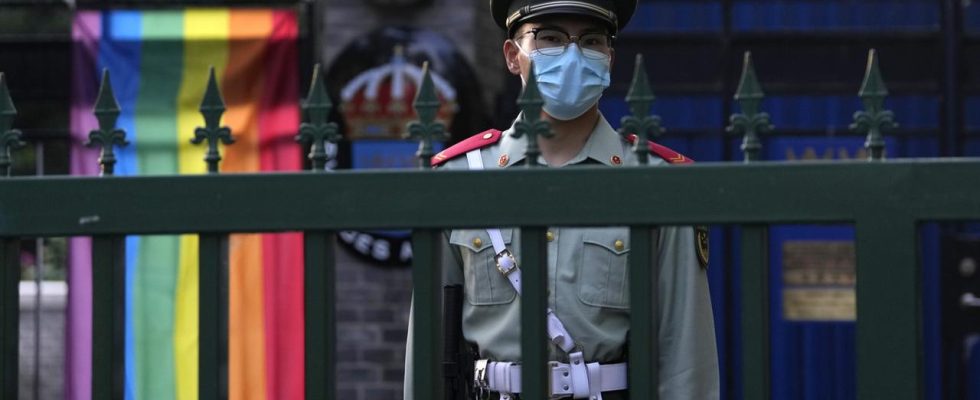The Chinese state is increasingly taking action against the LGBTQ community. Some events were discontinued, and there were also short-term cancellations in Pride month. Nevertheless, there is hope for change.
It’s very small and hidden. From the sidewalk you might think it’s a shop, with a motorbike in the window. But behind it there are a few folding chairs on the metal floor, there is a small bar, a few drinks. And there are pictures on the wall: photo portraits of people accompanied by short texts that tell a story about gays, lesbians, bisexuals and transgender people in China.
LGBTQ – you don’t see this lettering here. That would be too obvious. Officially for the Chinese authorities, it is about women’s stories. Feminism. That’s possible, LGBTQ not.
“What we’re exhibiting here, we selected beforehand, self-censored,” says a young woman. 80 percent of the things you exhibit are actually about women. “That’s how we were able to make the exhibition possible in the first place – in this space, which is relatively hidden. There’s a feeling that if we’re not discovered by the authorities today, maybe one day we will be.” That’s why she wants to remain anonymous.
“It’s something very common”
Your anonymity is to help preserve the place for as long as possible. Together with other women, she only founded it in mid-May, around the same time as the closure of the well-known LGBTQ center Beitong in the Chinese capital Beijing made headlines. This campaigned for the rights of gay, lesbian and transgender people and offered advisory support.
It’s a shame, there’s no way to prevent something like this, she says. “Nevertheless, we still want to do as much as possible. We hope that we can create a utopia – and not just here – in this country, but all over the world.”
The young woman speaks of the utopia that love between people, regardless of their gender identity, is simply normal. She looks at the pictures on the wall. One shows two Chinese women kissing – in the middle of a street in China. In the background, passers-by go their way, a food delivery man drives past the couple on his scooter. This is her favorite picture.
“I can feel your kiss, even though it takes place in a lively, everyday situation. I don’t have to worry about everything that happens around it,” she says. Everyone goes on living as if nothing happened, pass by, deliver food. She wonders if this will one day become normal. “It’s just something very common.”
Homosexuality in families is often taboo
But in China it is not. Even though homosexuality was decriminalized in the People’s Republic in 1997, the subject is taboo in many families. Some report losing their friends after coming out. And many people are also discriminated against at work because of their sexual orientation. As a result, they often remain silent unless they are heterosexual.
Since the takeover of power by head of state and party leader Xi Jinping, the state has increasingly taken action against the LGBTQ community. At universities, for example, groups have been closed in recent years, profiles in online networks have been censored, some events have been canceled and numerous LGBTQ dating apps have gradually been banned. This year, several LGBTQ events have been canceled at short notice during Pride Month June or are taking place on a much smaller scale than before.
LGBTQ run in Shanghai
“Of course we can’t do parades in China, so running is our way,” says a Taiwanese who has been organizing an international six-kilometer LGBTQ run in Shanghai for four years. In order to protect her identity, we also do not give her name. This year, she asked participants not to wear rainbow accessories. That has not been the case in recent years. She limited the number of participants to 50 because there is no freedom of assembly in China.
“When we organized the whole thing, we didn’t make posters,” she says. The whole thing would spread too easily, draw too much attention, they wouldn’t have posted it on their public online networks. Word of mouth got around from start to finish.
That’s why, she says, she didn’t expect much this year. Everyone is currently being particularly careful. But then 45 people came together. Some dared to put on a rainbow sweatband or a pin, and there was also a rainbow flag. “It was really moving and shows me that the activity was successful,” she says. She does not want to speak publicly about whether the action had consequences.

